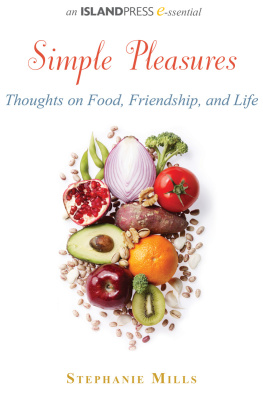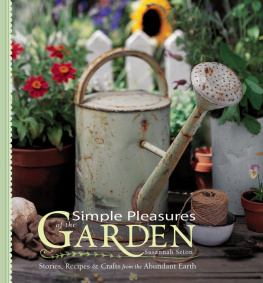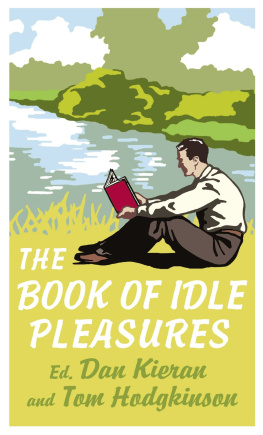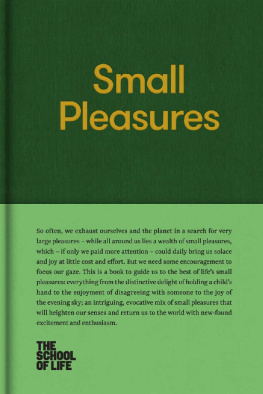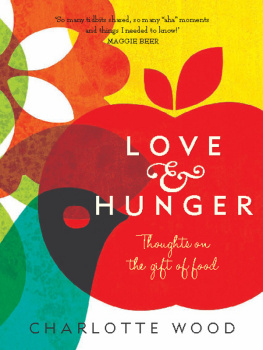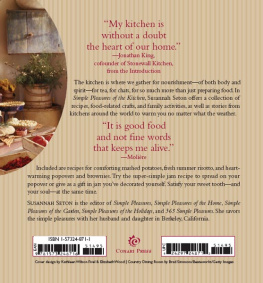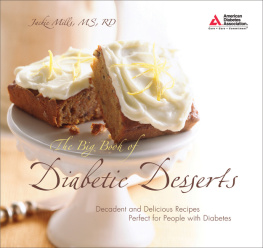Simple
Pleasures
Thoughts on Food,
Friendship, and Life
An Excerpt from Epicurean Simplicity
Stephanie Mills

Washington | Covelo | London
Copyright 2012 Stephanie Mills
All rights reserved under International and Pan-American Copyright Conventions. No part of this book may be reproduced in any form or by any means without permission in writing from the publisher: Island Press, 2000 M St NW, Suite 650, Washington DC 20036
ISLAND PRESS is a trademark of the Center for Resource Economics.
978-1-61091-451-2
Cover design by Maureen Gately
Cover image by Luis Albuquerque, iStockphoto.com
About the Island Press E-ssentials Program
Since 1984, Island Press has been working with innovative thinkers to stimulate, shape, and communicate essential ideas. As a nonprofit organization committed to advancing sustainability, we publish widely in the fields of ecosystem conservation and management, urban design and community development, energy, economics, environmental policy, and health. The Island Press E-ssentials Program is a series of electronic-only works that complement our book program. These timely examinations of important issues are intended to be readable in a couple of hours yet illuminate genuine complexity, and inspire readers to take action to foster a healthy planet. Learn more about Island Press E-ssentials at www.islandpress.org/essentials .
Thoughts on Conviviality
by Stephanie Mills
Onions and butter; flour, celery, and salt: all the makings of the soup except for the well water came from the co-op. There were no ingredients that couldnt have been grown here given the right farms, farmers, and markets. Even the dill and caraway seed that flavored it could have been the produce of somebodys garden.
Even in America, even in an information age, food is not something to take for granted but a matter of life and death. Its strange to live in a time that has alienated almost all of us from direct participation in providing our food. It takes good land and a lot of work and skill to produce food well and in salable quantity. For most of us, even the more-successful gardeners, the farmer is the woman or man who keeps us fed. I know some of the organic farmers in these parts. They combine entrepreneurial acumen, soil nurturing, plant and animal husbandry, mechanical skill, and fortitude to encourage the land to sustain the people. These are the folks who should be getting the genius grants. My farmer friends, I notice, live in their bodies, articulating their intelligence and creativity physically. They seem less deluded by the cultures departmentalization of physical and mental than anyone else I know.
Hunger, too, unifies and focuses the being. To be able to reply to its demands through the pleasure of cooking has become one of those ancient everyday activities for which few people have the time. There are even prefabricated peanut-butter sandwiches for busy schoolchildren. Puttering in the kitchen to make myself a meal, using simple foods, tools, and skills, could be regarded as a luxury in a world where fast food, junk food, or insufficient food are the commoner portion.
Celery is such a polysensory foodstuff, with its unassertive but lingering flavor, with all those strings and all that crunch. After dicing the celery, I chop the onion as quickly as I can and still keep my fingertips, blinking back the tears. Working with onions must be nearly as old as cooking itself. An onions bulb is a potent fact and useful metaphorthe powerful, pearly layers upon layers, grown in the dark of the soil, swaddling a good cry. Diaphanous tissue of cells taut with rain, transmuted into aromatic, stinging juice, which, in a heated encounter with butter, yield the most alluring of the kitchens perfumes.
I have been a gourmet cook, but not anymore. These days, I dont follow recipes. Usually the ingredients at hand determine the dish. The celery soup came to be because there had been an abundance of apples in the house the week before. Id bought the celery to dice a few ribs into a Waldorf salad. Snacking my way through the rest of the celery didnt appeal. Utilizing it all in one fell soup seemed the more practical and pleasurable thing to do. Respecting food, preparing it nicely, set me thinking about hospitality, covenants, and friendships. Although in this instance I was cooking for myself, theres nothing I like better than cooking for friends.
Its entirely apt that the title of one of the classic cookbooks speaks of the joy of cooking, all that sensuous, creative pleasure that precedes the joy of eating. Working hours are longer, lifes pace has increased brutally, and children are booked solid with sports and other extracurricular activities. To be robbed of time for the enjoyable, and ultimately convivial, work that can be done in the kitchen and shared at the table certainly bespeaks a social ill, a destitution in affluence.
Learning to cook is a lifetime sport. In times of bounty, the culinary possibilities are inspirational and call for feasting. In lean times, parsimony with the parsnips, hunger as a seasoning, and remembering to say grace may all make the meal. Lifes too short to forgo the gentle smiles that come of fondling eggplants and tomatoes, of being lost in a cloud of steam rising from a colander full of draining pasta, of drawing in the aroma of onions sauting in butter. Of course, cooking is work. But it can be play at the same time and can reunite some of the scattered pieces of living. Like any endeavor, its a lot more gratifying if its undertaken freely and is not some thankless indenture. As with voluntary simplicity itself, volition makes all the difference.
My mother was a good and enthusiastic cook who just plain loved food. What I learned from her was not how to cook but that cooking can be an absorbing activity. Mama rarely accepted help in the kitchen, but she didnt mind a little company. She and her family had lived through the Great Depression in a small town in southern Mississippi. Her mother was a good cook, and her father was a doctor whose patients sometimes paid their bills in chickens or watermelons. There were other wonderful makings to be had: fish from the Gulf of Mexico, vegetables grown in household gardens and on nearby farms. Hunger was not a part of my mothers youth, even in the lean times. She ate at a big table where her mother fed ten or twelve at dinner: father, brother, sister-in-law, sisters, brothers-in-law, and their children.
My visits to Grandmother Garrison at her home in Mississippi were so long agoshe was so old and I was so youngthat I cant recollect any of the meals. However, I keep in my wallet a scrap of ruled paper, one of my octogenarian aunt Madges menus. Madge, Mamas older sister, cooked the following for a family dinner on the occasion of one of my visits to her home in Mobile, Alabama: butter beans, fresh fried corn, field peas, corn bread, dressing, roast, gravy, rice, Waldorf salad, and creamed potatoes for my second-cousin Josh, who got his special preferences. All of it was delicious, if not heart-smart. Perhaps it harked back to Grandmothers style of cooking.
Mama headed for New Orleans, the nearest big city, when she graduated from college. There, I imagine, she experienced a standard of cuisine that was pretty good even if the eatery happened to be the poboy shop downstairs from the French Quarter apartment she shared with her sister Weesie, or the tea room at the Maison Blanche department store.
Mama read Gourmet magazine and clipped recipes from the Phoenix Gazette. When I was still a baby, she learned to make Mexican food from Mrs. Musa, our Mexican landlady. She swapped recipes with the bonne vivant Weesie and occasionally made dishes, such as coconut cake, fried chicken, or Depression spaghetti, that her mother, Mattie, used to make. My mother, the perfectionist, boldly tried new things. She liked nothing better than the challenge of preparing some new dessert or canap. With Dad, she would mount the occasional grand project, such as a huge batch of dark fruitcake for the holidays. This required toasting a washtub full of flour, beating a sweet, caloric wealth of butter, eggs, and sugar, and then folding a kings ransom of jewel-like glaced fruit into the batter.
Next page
